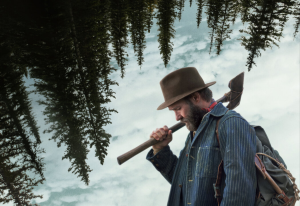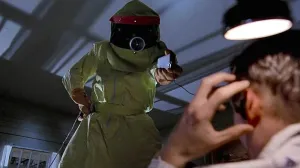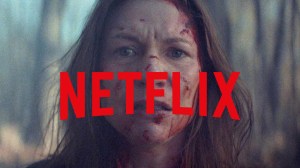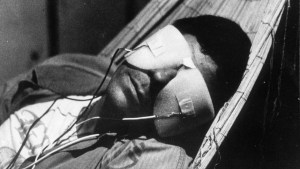Kate Mulgrew may be best known as Star Trek’s Capt. Kathryn Janeway but she’s traded Starfleet for the CIA in The Man Who Fell To Earth, the sequel to the 1976 David Bowie-led movie, from Star Trek veterans Jenny Lumet and Alex Kurtzman. Mulgrew plays Drew Finch in the Showtime series, a veteran of the intelligence world who has a complex relationship with her protege Spencer Clay (Jimmi Simpsons), a hard-line agent who became a pariah. She makes contact with Spencer again when the arrival of Faraday (Chiwetel Ejiofor) on Earth presents the opportunity for him to reclaim his reputation by finding Thomas Newton (originated by Bowie, but played here by Bill Nighy).
Videos by ComicBook.com
ComicBook.com had the chance to talk to Mulgrew about what brought her to The Man Who Fell To Earth, Drew and Spencer’s unique relationship, and her stubborn sense of hope. Here’s what she had to say:

So let’s talk about The Man Who Fell To Earth, which I’ve been watching. It’s a wonderful series.
Kate Mulgrew: Oh, good. Do you like it?
I do. I honestly, I’d never seen the movie or read the book or anything, so I had no expectations going in. And I’ve been absolutely, totally enthralled with it throughout.
I’m so glad to hear that. And what aspects of it are most enthralling to you?
It’s a combination of, there are great performances in it. I mean, you’re great, but also Chiwetel [Ejiofor], just the way he interprets that alien character.
He’s wonderful in it. He’s absolutely remarkable in it. Don’t you think?
Yes, it’s wonderful. And it has a really cool, polished style to it that I’ve really come to appreciate.
That’s Kurtzman. That’s the Kurtzman stamp of perfection.
But I wanted to ask you, like I said, I came to it not knowing much about the book, not having seen the movie — I’ve seen it now, but not then. When this came to you, what was it that hooked you about the idea of being in this? Was it familiarity with any of those previous versions of it? Was it just the script, the character? What hooked you into the project?
No, like you, I came to it clean. I had no idea. I’d heard of it, of course. And I knew that David Bowie had created the character in the feature in the early seventies, but I hadn’t read the book. And I’m glad. It’s sort of the way I came into Star Trek. I have very little science fiction background. It is not the genre to which I am most passionately attracted. So I’ve come to it in a very straightforward fashion. And that’s how through Finch and Kurtzman’s offer to play her.
I just thought it was a fascinating idea that this creature of the CIA, head of science and technology, involved in this very layered, very shadowy, very questionable relationship with her “adopted son” is on a mission to do something that is arguably deeply immoral if not altogether dangerous. And yet she construes it differently, very much through the lens of the old guard CIA, and also through the lens of a woman so ambitious, I think in her desire to be the best, the very best at what she does, that she will sacrifice anything to maintain that reputation, including the one person she has claimed to love unconditionally.
I’m really fascinated by this character and her relationship with Spencer, Jimmi Simpson’s character. There are so many layers there. On one hand, it’s almost maternal. On the other hand, it’s very much this professional, special agent deal. Can you talk at all about how you and Simpson worked on developing that relationship, and how their interaction would be on screen? Was it very natural? Did you have to workshop it a little bit together?
No, it’s so easy to answer that because I remember meeting Jimmi in St. James’ Park — I think that’s the first time we met in London, to run lines while we took a walk — and it was instant, something I’ve very seldom encountered in a long career of meeting actors. And I knew instantly that I was going to take a journey with this guy that would allow us to infiltrate one another, and I’m using that word specifically and carefully because as you said, the layers should at moments disturb. If they don’t, we failed. They should almost make the hairs on the back of your neck stand up when Finch and Spencer look at one another too intensely, when words are said that have a deeper meaning, and swords are crossed.
There seems to be at all times between Drew and Spencer high, high stakes. And she, for some reason, has taken it upon herself to conceal from him something that in the end, of course, would absolutely explode the relationship. But long before that happens, the far murkier reality of who Spencer Clay is, does the job. But together they are a hornets’ nest of thoughts and emotions, of high stakes, and arguably low morals, although cloaked in the tightest armor of a CIA operative that you could imagine. That’s who Drew Finch is. She is an absolute captain of the old guard.
I’m still thinking about what you said about how sci-fi isn’t necessarily the genre you gravitate to the most. But then you’re in this, you’re this iconic starship captain in Star Trek. Do you feel like coming at it as someone who’s not necessarily the biggest sci-fi fan has been an advantage to you in taking on these roles, that it gives you a different point of view than someone who is accustomed to the tropes of the genre? Or has it ever been an added challenge?
I don’t think there’s any question that it has served me. It’s very, very good not to be a fan of the material that is going to change your life. It’s very, very good to have an objective stance so that you can bring to bear on this character, on this job, in this case, Captain Janeway in Star Trek: Voyager, every one of the tools that I use for the best of my craft. Had I been head over heels in love with the idea of Star Trek, I think that I would’ve informed my characterization that way. And this way, I came in like a bolt from the blue, very straight, very clean, very unadorned, and unencumbered. And it really worked for Janeway.
Sci-fi — be it Star Trek or this show — often reflects our reality. I asked this of Chiwetel as well when I talked to him before this show began, but I’m wondering if you could talk a little bit about, looking at The Man Who Fell To Earth, what you think this show has to offer to audiences at this point in time, and this point in history, wand hat it might be trying to do and trying to say?
Well, we’re so close to everything, Jamie, aren’t we? We’re so perilously close. We’re so breathtakingly close to discovery, to space itself, to the reality and the parameters of space, to the hidden nature of space. And also we are very, very close to the destruction of the planet. So The Man Who Fell To Earth embraces all of that. And at its center is, I think, the key thing of wonder and possibility.
I think for any thinking human being, who has ever read anything about science, anything about space, who has ever read anything about our current status with AI, who has ever looked at what’s going on in Ukraine and the darkness of the rest of the world, this offers all the dimensions that exist outside of our consciousness. And it’s brilliant because it’s what very good science should do. Science fiction is called science fiction because it’s real science fictionalized. And I think it’s very seldom done as well as this one has been done by Kurtzman and company.
I feel like Star Trek is obviously an optimistic version of the future, and you talked about how this is reflecting where we are now., and I feel like, at least as far as the episodes that have come out so far, it’s a fairly optimistic or at least hopeful version of what might happen in the future. Do you yourself feel optimistic about the future, given everything that these shows you’re involved with are trying to touch on?
I’ve actually tried to divest myself of that kind of Pollyanna hopefulness. I don’t find it particularly attractive. And when I speak to exalted minds, vaunted mines such as Brian Greene or Reed, Feynman, or Einstein, I think it is probably much smarter to stand on the cliff and say, “It’s a plunge into the darkness where there is no hope.”
But unfortunately for me, or fortunately, hope has been a part of my nature from the time I understood my own consciousness, which was about the age of three, I think. And I don’t know why it’s indelible. I don’t know why it’s there. It’s certainly been threatened and challenged many times over a long life, but I cannot get rid of it. I do believe in hope. I believe it is the core virtue that raises us above the herd. I think it is why the species is remarkable. And I think it is why in the final analysis we are capable of love. So yes, I believe in hope. And I think that that is probably at the center of The Man Who Fell To Earth.
New episodes of The Man Who Fell To Earth debut Sundays on Showtime.








